从句与从句的转换,从句与短语的转换
状语从句的转换正确转换状语从句的句子结构

状语从句的转换正确转换状语从句的句子结构状语从句的转换:正确转换状语从句的句子结构状语从句是复合句中的一个从句,用来修饰主句中的动作、状态或程度。
在句子中起到状语的作用。
为了使句子更加清晰和简洁,我们可以尝试将状语从句转换成其他形式。
本文将介绍状语从句的转换技巧和正确的句子结构,帮助读者更加灵活运用这一句子成分。
一、将状语从句转换成独立结构状语从句转换成独立结构是指将整个状语从句改写为一个副词、介词短语或分词短语,使其与主句并列表达。
下面是一些具体的转换方法:1. 将时间状语从句转换成介词短语:原句:When the sun sets, the sky turns red.转换后:At sunset, the sky turns red.2. 将条件状语从句转换成介词短语:原句:If it rains tomorrow, we will stay at home.转换后:In case of rain tomorrow, we will stay at home.3. 将原因状语从句转换成介词短语:原句:Because it was raining, we stayed at home.转换后:Due to the rain, we stayed at home.4. 将目的状语从句转换成不定式短语:原句:I study hard so that I can pass the exam.转换后:I study hard to pass the exam.5. 将方式状语从句转换成独立结构:原句:She walked as if she were in pain.转换后:She walked with apparent pain.二、将状语从句转换成其他从句除了将状语从句转化为独立结构外,还可以将其转换成其他从句形式,如不完全倒装、倒装、强调等。
下面是一些具体的转换方法:1. 将时间状语从句转换成主从倒装:原句:While I was watching TV, the phone rang.转换后:Watching TV, the phone rang.2. 将原因状语从句转换成强调结构:原句:Since you insist, I will go with you.转换后:It is you who insist, so I will go with you.3. 将结果状语从句转换成强调结构:原句:So that everyone could hear, she spoke loudly.转换后:It was for everyone to hear that she spoke loudly.三、将状语从句转换成省略在一些情况下,我们可以直接省略状语从句中的一部分内容,从而简化句子结构。
句型转换的六种类型

句型转换的六种类型作者:赫艳馨来源:《疯狂英语·爱英语》2019年第03期句型转换题是中考常见的题型之一,主要考查考生对句子的构成、转化等方面知识的灵活运用能力,它具有规律性强、灵活性小等特点。
句型转换题是先给出一个句子,然后再给出一个包含几个空格处的句子,要求考生根据括号内的具体要求在空格处填入适当的单词或词组来完成句子。
从2018年各地中考试题来看,句型转换题主要包括下列六种类型:一、同义句转换同义句转换题是根据所给的句子,在第二句的空格处填入适当的单词或词组,使完成后的句子意思与所给句子的意思相同。
这类句型转换题又可以分为词汇的转换和句子的转换。
1.词汇的转换词汇的转换,包括近义词、同义词等之间的转换。
需要注意的是,转换后的单词或词组的词形变化要与句子其他成分相适应。
例如:①My sister will take care of my cat when I am on holiday.(改为同义句)My sister will______________ ______________my cat when I am on holiday.【2018·重庆中考题A卷】【答案与解析】look after 考查同义词短语。
谓语动词take care of意为“照顾;照看”,与look after同义。
②My father often rode his bike to work last year.(改为同义句)My father____________________________ ride his bike to work last year.【2018·达州中考题】【答案与解析】used to 考查固定短语。
used to意为“过去常常”,后接动词原形。
2.句子的转换句子的转换包括简单句之间、简单句和复合句之间、复合句和复合句之间的转换。
在答题的时候,考生要根據句子的类型,注意连接词的使用。
高考重难点语法-定语从句和分词短语的转化
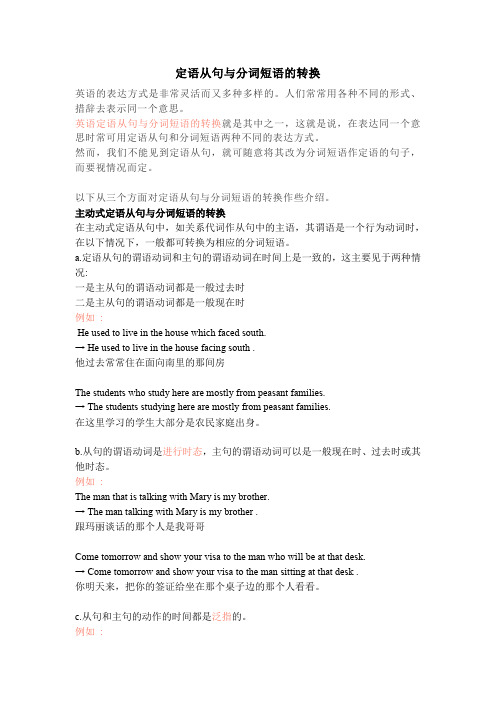
定语从句与分词短语的转换英语的表达方式是非常灵活而又多种多样的。
人们常常用各种不同的形式、措辞去表示同一个意思。
英语定语从句与分词短语的转换就是其中之一,这就是说,在表达同一个意思时常可用定语从句和分词短语两种不同的表达方式。
然而,我们不能见到定语从句,就可随意将其改为分词短语作定语的句子,而要视情况而定。
以下从三个方面对定语从句与分词短语的转换作些介绍。
主动式定语从句与分词短语的转换在主动式定语从句中,如关系代词作从句中的主语,其谓语是一个行为动词时,在以下情况下,一般都可转换为相应的分词短语。
a.定语从句的谓语动词和主句的谓语动词在时间上是一致的,这主要见于两种情况:一是主从句的谓语动词都是一般过去时二是主从句的谓语动词都是一般现在时例如:He used to live in the house which faced south.→ He used to live in the house facing south .他过去常常住在面向南里的那间房The students who study here are mostly from peasant families.→ The students studying here are mostly from peasant families.在这里学习的学生大部分是农民家庭出身。
b.从句的谓语动词是进行时态,主句的谓语动词可以是一般现在时、过去时或其他时态。
例如:The man that is talking with Mary is my brother.→ The man talkin g with Mary is my brother .跟玛丽谈话的那个人是我哥哥Come tomorrow and show your visa to the man who will be at that desk.→ Come tomorrow and show your visa to the man sitting at that desk .你明天来,把你的签证给坐在那个桌子边的那个人看看。
非谓语动词与状语从句的转化

非谓语动词与状语从句的转化非谓语动词与状语从句的转化状语从句是同学们在初中就掌握的内容,现将非谓语动词与状语从句之间转换的规律作一归纳,帮助大家更好地掌握非谓语动词。
一、非谓语动词与时间状语从句间的转换。
1 .当主、从句的主语一致,主、从句的谓语动作同时或L乎同时发生时,且从句中谓语动词是主动语态,可用现在分词的一般式转换。
如:When they heard the news,they jumped with joy.Hearing the news,they jumped with joy.当他们听到这则消息时,高兴得跳了起来。
2 .当主、从句的主语一致,从句中的动作发生在主句的动作之前或从句中谓语动词是完成时,可用现在分词的完成式转换。
如:After he(had)returned home,he began to work.Having returned home,he began to work.回到家以后,他开始工作。
3 .当主、从句主语一致时,由after,before,since,as soon as等引导的从句可分别用after/before/since/on加动名词短语转换。
如:Since I saw you last,I have been ill.Since seeing you last,I have been ill.自从我上次见你后,就一直在生病。
As soon as he heard this,he couldn’t help crying.On hearing this,he couldn’t help crying.他一听到这事,不禁哭了起来。
4 .当主、从句主语一致时,以when,while引导的从句,也可用when /while加现在分词短语转换。
如While we were walking along the river, we heard someone shouting.While walking along the river,we heard someone shouting当我们正沿着河走时,我们听到有人喊叫。
条件状语从句的引导词及句型转换

条件状语从句的引导词及句型转换条件状语从句是英语中常用的一种从句结构,用来表示条件、原因、目的等。
在条件状语从句中,引导词起着引导句子结构的作用,而句型转换则可以使表达更加灵活多样。
本文将介绍条件状语从句的常见引导词及句型转换方法。
一、条件状语从句的引导词常见的条件状语从句引导词有:if, whether, unless, provided (that), as long as等。
1. IfIf是条件状语从句的最常见引导词,表示“如果”,可用来引导真实条件状语从句与虚拟条件状语从句。
例如:- If it rains tomorrow, we will stay at home.- If I were you, I would take the job.2. WhetherWhether是用来引导陈述句的间接疑问句,表示“是否”。
例如:- I don't know whether he will come to the party or not.3. UnlessUnless表示“除非”,相当于if...not,引导否定条件状语从句。
例如:- You will fail the exam unless you study hard.4. Provided (that)Provided (that)表示“只要”,相当于as long as。
例如:- You can go out to play provided (that) you finish your homework.二、条件状语从句的句型转换条件状语从句可以通过句型转换来增加语言表达的多样性。
1. 将条件状语从句改为条件状语从句的省略句当主句与条件从句的主语和谓语相同时,可以将从句中的主语和be 动词省略。
例如:- If you come late, you will miss the train.变为:Come late, you will miss the train.2. 将条件状语从句改为条件状语从句的倒装句当主句与条件从句中的某些状语或状语修饰语倒装时,可以将条件从句改为倒装句。
分词短语与定语从句 状语从句的转换

The students studying here are mostly from peasant familiesThe students who study here are mostly from peasant families在这里学习的学生大部分是农民家庭出身。
风庆轮航行32,000海里后,胜利地返回上海。
风庆轮是中国制造的并且完全是中国装备的一艘轮船。
The man talking with Mary is my brother.跟玛丽谈话的那个人是我哥哥。
This is a book written by a worker.This is a book that is written by a worker.这是工人写的一本书。
Arriving at the village, she saw several machines working in the fields.When she arrived at the village,she saw several machines working in the fields.到达村庄时,她看见几台机器在田间工作。
I learned a lot while working in the countryside.I learned a lot while I worked in the countryside.,我在农村劳动时学了许多东西。
Since you are a Party member,you should set an example an example to others.Being a Party member, you should set an example an example to others.你是个党员,就应该给别人树立个榜样。
Listening to the Party,you will certainly succeed.你如果听党的话,肯定会成功。
原题目: 状语从句与非谓语动词的转化(写作)

原题目: 状语从句与非谓语动词的转化(写作)在写作中,状语从句和非谓语动词都是常用的语法结构。
它们可以用来表达时间、原因、条件、目的等不同的含义。
本文将对状语从句和非谓语动词的使用进行比较,并提供一些转化的方法。
一、状语从句的转化状语从句在句子中作为状语,通常由连词引导。
为了使句子更加简洁明了,我们可以将状语从句转化为其他形式。
1. 将状语从句转化为分词短语例如:- 状语从句:因为我迟到了,所以老师生气了。
- 分词短语:迟到了,老师生气了。
2. 将状语从句转化为不定式短语例如:- 状语从句:虽然天气很冷,但他还是出去了跑步。
- 不定式短语:天气很冷,他还是出去了跑步。
3. 将状语从句转化为介词短语例如:- 状语从句:当他听到好消息时,他高兴得跳了起来。
- 介词短语:听到好消息时,他高兴得跳了起来。
二、非谓语动词的转化非谓语动词是动词的一种形式,可以作主语、宾语、定语或状语。
在写作中,我们可以将非谓语动词转化为其他形式,以减少句子的复杂性。
1. 将非谓语动词转化为动词-ing形式例如:- 非谓语动词:我喜欢读书。
- 动词-ing形式:我喜欢阅读。
2. 将非谓语动词转化为动词不定式例如:- 非谓语动词:他跟我一起完成了任务。
- 动词不定式:他和我一起完成任务。
3. 将非谓语动词转化为名词例如:- 非谓语动词:她喜欢游泳。
- 名词:她喜欢游泳。
总结:通过将状语从句和非谓语动词进行转化,可以使句子更加简洁明了。
在实际写作中,我们可以根据需要选择合适的转化形式。
然而,需要注意的是,转化时要注意保持句子的逻辑完整性和语法准确性。
以上是关于状语从句与非谓语动词的转化的简介,希望能对您有所帮助。
英语句型转换的方法与例子

英语句型转换的方法与例子摘要英语句型转换是指按照一定的要求,把一个句子改写成另一个意思相同或相近的句子,不改变原句的主要意思。
英语句型转换的目的是为了使句子更加简洁、准确、自然和地道,也可以增加句子的变化和丰富性,避免重复和单调。
英语句型转换的方法有很多,本文将介绍以下几种常见的方法:同义词或近义词替换主动语态和被动语态互换陈述句和疑问句互换直接引语和间接引语互换并列句和复合句互换定语从句和非限制性定语从句互换分词短语和独立主格结构互换一、同义词或近义词替换定义同义词或近义词替换是指用意思相同或相近的词或短语来替换原句中的某些词或短语,使句子更加简洁、准确或地道。
规则替换的词或短语必须在意思、用法、搭配和语气上与原词或短语相符。
替换后的句子不能改变原句的主要意思。
替换后的句子不能造成歧义或误解。
例子原句替换后的句子He is very angry with me.He is very mad at me.She passed away last night.She died last night.He made a mistake in the test.He went wrong in the test.I can't stand him.I hate him.He gave me a hand with my homework.He helped me with my homework.二、主动语态和被动语态互换定义主动语态和被动语态互换是指把一个主动语态的句子改写成一个被动语态的句子,或者把一个被动语态的句子改写成一个主动语态的句子,使句子更加客观、强调或适应上下文。
规则主动语态变被动语态时,要把原主语变成by短语放在被动语态谓语之后,把原宾语变成新主语放在被动语态谓语之前,把原谓语动词变成被动形式(即be+过去分词),并保持时态、人称和数一致。
被动语态变主动语态时,要把原by短语去掉,把原主语变成新宾语放在主动谓语之后,把原谓语动词变成主动形式,并保持时态、人称和数一致。
从句与主从复合句的关系与转换
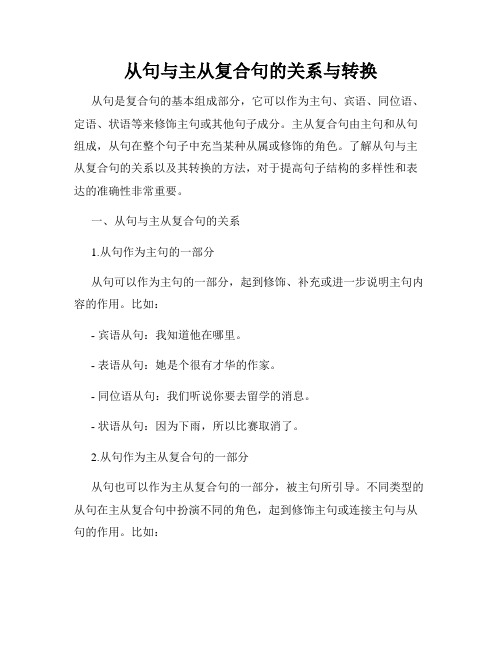
从句与主从复合句的关系与转换从句是复合句的基本组成部分,它可以作为主句、宾语、同位语、定语、状语等来修饰主句或其他句子成分。
主从复合句由主句和从句组成,从句在整个句子中充当某种从属或修饰的角色。
了解从句与主从复合句的关系以及其转换的方法,对于提高句子结构的多样性和表达的准确性非常重要。
一、从句与主从复合句的关系1.从句作为主句的一部分从句可以作为主句的一部分,起到修饰、补充或进一步说明主句内容的作用。
比如:- 宾语从句:我知道他在哪里。
- 表语从句:她是个很有才华的作家。
- 同位语从句:我们听说你要去留学的消息。
- 状语从句:因为下雨,所以比赛取消了。
2.从句作为主从复合句的一部分从句也可以作为主从复合句的一部分,被主句所引导。
不同类型的从句在主从复合句中扮演不同的角色,起到修饰主句或连接主句与从句的作用。
比如:- 名词性从句:他说他会来参加会议。
名词性从句可以作为主语、宾语、表语等,承担主句的语法成分。
- 定语从句:我正在读的那本书非常有趣。
定语从句修饰主句中的名词或代词,进一步说明其特征或界定其范围。
- 状语从句:明天你来不来我都做好准备。
状语从句可以修饰主句的时间、原因、条件、方式等。
二、从句的转换1.从句转换为独立句有时候,为了精炼文章的表达或者提高句子的多样性,我们可以将从句转换为独立句。
例如,状语从句可以转换为独立句:原句:因为下雨,所以比赛取消了。
转换句:下雨了,比赛取消。
2.独立句转换为从句有时候,为了突出某个句子成分的重要性,我们可以将独立句转换为从句。
例如,独立句转换为名词性从句:原句:爱情使人快乐。
转换句:人人愿意爱情使自己快乐。
3.从句的转换与省略有些从句在实际表达中存在重复或显得多余,因此可以通过转换或省略来简化句子。
例1:原句中名词性从句的转换与省略:原句:我不知道你会不会来参加会议。
转换句:我对你是否会来参加会议不了解。
例2:原句中定语从句的转换与省略:原句:我正在读的那本书非常有趣。
英语限定从属分句与短语的转换现象

表语从句可 以转换为不定式 短语或名词 短语 。表 语 从句是 否能转换 为不定 式短语取 决于作 主句 主语的 名 词短语 ,只有该名词 短语能与 不定式连用 ,才能进
行这种转 换。例如 :
Hi s sta ewi c meata h r — Hi s swih i h t l be o e c e . ÷ h l swih
a o d t ec r e su tu . r un h o n rwa n r e
i o b c m e at a h r st e o e c e .
、
名词 性从句与短语的转换
名词 性从句具体 包括主语从 句 、宾语从 句 、表语 从 句和 同位语从 句 ,分别 在句 中做 主语 、宾语 、主语
补 语 和 同位 语 。
Th si a es g e td i swh t u g se . h
限 定 从 属 分 句 ,简 称 从 句 ,是 以 限定 动 词 词 组 作 谓 语 动 词 的从 属 分 句 。从 句 法 功 能 上 划 分 ,从 句 可 分
I i t p d t a n h u d g tS o c ie .—’I l t s su i h t o e s o l e O c n e t d tS s u i o g t O c n e t d. t p d t e o c ie S He wa h n i g a o twh th h u d d e t s t i k n b u a e s o l o n x . He
Th si i u g sin i sh ss g e t . o Th t s a i
Th ti wh ed s ge s t o b u h s a yh ia a o o i ia r e n t o b u s h e s nfrh sd s g e me t hy u a o thi. wi t
定语从句和分词短语做定语的区别
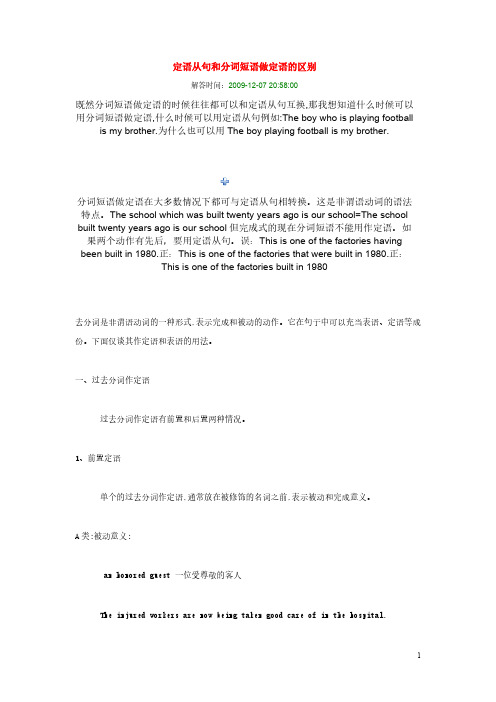
定语从句和分词短语做定语的区别解答时间:2009-12-07 20:58:00既然分词短语做定语的时候往往都可以和定语从句互换,那我想知道什么时候可以用分词短语做定语,什么时候可以用定语从句例如:The boy who is playing football is my brother.为什么也可以用The boy playing football is my brother.分词短语做定语在大多数情况下都可与定语从句相转换。
这是非谓语动词的语法特点。
The school which was built twenty years ago is our school=The school built twenty years ago is our school但完成式的现在分词短语不能用作定语。
如果两个动作有先后,要用定语从句。
误:This is one of the factories having been built in 1980.正:This is one of the factories that were built in 1980.正:This is one of the factories built in 1980去分词是非谓语动词的一种形式,表示完成和被动的动作。
它在句子中可以充当表语、定语等成份。
下面仅谈其作定语和表语的用法。
一、过去分词作定语过去分词作定语有前置和后置两种情况。
1、前置定语单个的过去分词作定语,通常放在被修饰的名词之前,表示被动和完成意义。
A类:被动意义:an honored guest 一位受尊敬的客人The injured workers are now being taken good care of in the hospital.受伤的工人现正在医院受到良好的照料。
B类:完成意义:a retired teacher 一位退休的教师They are cleaning the fallen leaves in the yard.他们正在打扫院子里的落叶。
英语句型转换六步口诀

英语句型转换六步口诀
英语句型转换六步口诀如下:
1.确定句型。
首先判断所给句子属于哪种句型,是简单句、并列句还是复合句,若是简单句,主谓是关键,谓语要完整。
2.划分成分。
把句子的各个成分划开,尤其是作定语用的名词、短语或从句等,以便于把主要句子成分和次要成分分开。
3.提炼主干。
把句子的主语、谓语、宾语等主要成分提炼出来,去掉从句或修饰语等次要成分。
4.句型转换。
把提炼出来的句子主干按照与给定句子不同的语序重新排列,同时对句子的其他成分作相应的调整或改变。
5.检查纠错。
完成转换后,应检查所改句子是否符合语法规则,意思是否与原句一致,有无逻辑错误等。
6.举一反三。
将所改句子与原句进行对比,找出两者之间的异同点,总结规律,以便在以后的练习中加以运用。
以上是英语句型转换六步口诀的介绍,希望能对您有所帮助。
从句与从句的转换,从句与短语的转换【最新】
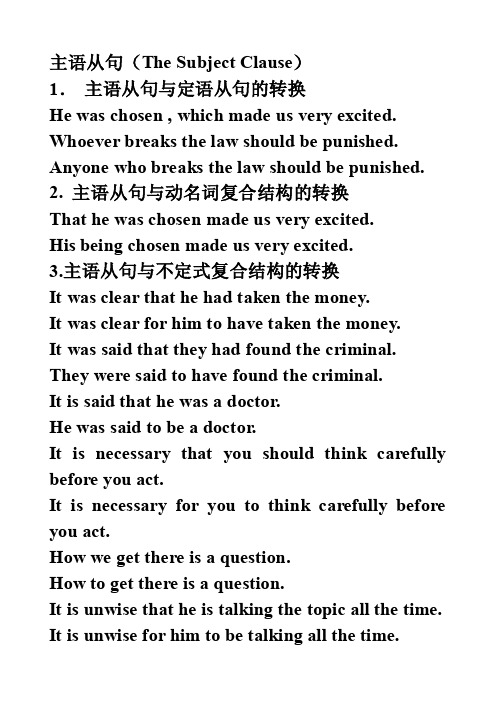
主语从句(The Subject Clause)1.主语从句与定语从句的转换He was chosen , which made us very excited. Whoever breaks the law should be punished. Anyone who breaks the law should be punished. 2. 主语从句与动名词复合结构的转换That he was chosen made us very excited.His being chosen made us very excited.3.主语从句与不定式复合结构的转换It was clear that he had taken the money.It was clear for him to have taken the money.It was said that they had found the criminal. They were said to have found the criminal.It is said that he was a doctor.He was said to be a doctor.It is necessary that you should think carefully before you act.It is necessary for you to think carefully before you act.How we get there is a question.How to get there is a question.It is unwise that he is talking the topic all the time. It is unwise for him to be talking all the time.It is said that the building had been destroyed in a fire two years ago.The building is said to have been destroyed in a fire two years ago.表语从句(The Predicative Clause)1表语从句与不定式The question is whether she can speak English. The question is whether to speak English there. His wish was to become a cashier.His wish was that he would become a cashier.The question is how we can help him.The question is how to help him.2. 表语从句与定语从句That is why you are always late for school.That is the reason why you are always late for school.同位语从句(The Appositive Clause)I have no idea when I will be back.I have no idea when to be back..宾语从句(The Object Clause)1.宾语从句与动名词He is sorry for what he has done.He is sorry for his having done.I don’t like that you are late.I don’t like your being late.He is very interested in what you are doing.He is very interested in your doing.2. 宾语从句与不定式The boy pretended that he was doing his homework when his mother came back.The boy pretended to be doing his homework when his mother came back.I wonder where I should go.I wonder where to go.The teacher told Mary that she should not be late for school again.The teacher told Mary not to be late for school again.I saw that he came and sat down.I saw him come and sit down.I heard her sing in her room last night.I heard that she sang in her room last night.3. 宾语从句与定语从句He told me what he had done .He told me all that he had done.I know why he studies so hard.I know the reason why he studies so hard.4. 宾语从句与分词I saw them playing basketball when I went past the playground.I saw that they were playing basketball when I went past the playground.5. 宾语从句与表语从句I suggest that you should go to school at once.My suggestion is that you should go to school at once.定语从句1.与不定式Do you have anything to say for yourself ?Do you have anything you want to say for yourself /Is there anything to do for you ?Is there anything I can do for you ?It is time for us to go home.It is high time that we went home.2.与分词The girl who is standing on the stage is my sister. The girl standing on the stage is my sister.This is the factory which was built in 1987.This is the factory built in 1987.3.与主语从句The reason why he didn’t turn up was not made clear.Why he didn’t turn up was not made clear.状语从句1.与不定式He visited London in order that he could see his parents.He visited London in order to see his parents.He was so fat that he couldn’t climb the tree.He was too young to climb the tree.We use a hammer so that we may knock in nails. We use a hammer to knock in nails.I was foolish because I expected him to write to me.I was foolish to have expected him to write to me.He was so lucky that he won the prize.He was lucky enough to win the prize.He was so near that I could not avoid him.He was too near for me to avoid him.2.与分词As he knew nothing about the matter , he kept quiet during the meeting.Knowing nothing about the matter, he kept quiet during the meeting.Because he didn’t know what to say, he kept quiet during the meeting.Not knowing what to say, he kept quiet during the meeting.After he had finished his work, he went out for a walk.Having finished his work, he went out for a walk. If weather permits, we’ll visit him.Weather permitting, we’ll visit him.3.与动名词We use a hammer so that we may knock in nails. We use a hammer for knocking in nails.The girl was praised because she often helpedothers.The girl was praised for often helping others.4.与介词短语They went out though it rained.They went out in spite of the rain.附加工作总结一篇,不需要的朋友下载后可以编辑删除,谢谢安全生产监管执法工作方案5篇第一篇一、指导思想2014年,全区安全生产监管执法工作要以科学发展观为指导,全面贯彻落实《国务院关于进一步加强企业安全生产工作的通知》和《省政府关于进一步加强企业安全生产工作的意见》文件精神,进一步规范安全生产监管执法行为,落实行政执法责任制,提高依法行政水平,严厉打击安全生产领域的非法违法行为,及时消除事故隐患,促进全区安全生产形势进一步稳定好转。
状语从句与名词性从句的转换
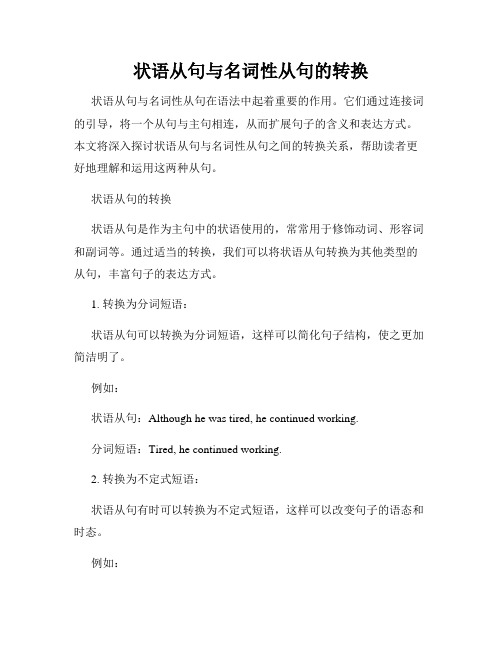
状语从句与名词性从句的转换状语从句与名词性从句在语法中起着重要的作用。
它们通过连接词的引导,将一个从句与主句相连,从而扩展句子的含义和表达方式。
本文将深入探讨状语从句与名词性从句之间的转换关系,帮助读者更好地理解和运用这两种从句。
状语从句的转换状语从句是作为主句中的状语使用的,常常用于修饰动词、形容词和副词等。
通过适当的转换,我们可以将状语从句转换为其他类型的从句,丰富句子的表达方式。
1. 转换为分词短语:状语从句可以转换为分词短语,这样可以简化句子结构,使之更加简洁明了。
例如:状语从句:Although he was tired, he continued working.分词短语:Tired, he continued working.2. 转换为不定式短语:状语从句有时可以转换为不定式短语,这样可以改变句子的语态和时态。
例如:状语从句:When the sun sets, the birds start singing.不定式短语:To see the sun set, the birds start singing.名词性从句的转换名词性从句充当主语、宾语、表语或同位语等成分,起着名词的作用。
在需要转换的情况下,我们可以将名词性从句转换为其他类型的从句,以增强句子的表达效果。
1. 转换为简化句:名词性从句可以通过简化句子的结构来转换。
这样可以使句子更加简洁明了。
例如:名词性从句:What she said is true.简化句:Her words are true.2. 转换为动名词短语:名词性从句有时可以转换为动名词短语,这样可以增加句子的动态性和流畅度。
例如:名词性从句:Whether she will come is uncertain.动名词短语:Her coming is uncertain.综合运用除了以上的转换方式外,我们还可以根据具体的语境和表达需要,综合运用状语从句和名词性从句的转换。
阅读理解题中的同义句如何辨认

阅读理解题中的同义句如何辨认一、关键信息1、同义句的定义和特点2、辨认同义句的方法和技巧3、常见的同义表达形式4、练习和实践的重要性二、协议内容11 同义句的定义同义句指的是在意义上相同或相近,但在表达方式上有所不同的句子。
在阅读理解中,正确辨认同义句对于准确理解文章的含义至关重要。
111 同义句的特点同义句通常具有相似的核心意思,但词汇、语法结构或语序可能会有所变化。
例如,使用近义词替换、词性转换、语态变化、从句与短语的转换等方式来构建不同的句子。
12 辨认同义句的方法和技巧121 词汇层面关注词汇的近义词和同义词。
在阅读过程中,积累常见的近义词组,如“big large huge”“happy glad joyful”等。
同时,注意一词多义的情况,某些单词在不同语境中可能有相近的含义。
122 语法结构层面了解不同的语法结构可以表达相同的意思。
例如,主动语态和被动语态的转换,“The boy ate the apple”和“The apple was eaten by the boy”;简单句和复合句的转换,“He is very tall”和“He is so tall that he can touch the ceiling”123 逻辑推理层面通过对上下文的理解和逻辑推理来判断句子是否同义。
如果两个句子在逻辑上能够相互印证,且表达的主要内容一致,那么它们很可能是同义句。
124 语境分析层面结合文章的主题、背景和上下文来判断同义句。
有些句子单独看可能不同义,但在特定的语境中表达的是相同的意思。
13 常见的同义表达形式131 词汇替换使用意思相近的单词或词组进行替换,如“start begin”“difficult hard”等。
132 短语替换用不同的短语来表达相同的概念,如“be fond of like”“be good at do well in”等。
133 句型转换如陈述句与疑问句、感叹句的转换,“You are beautiful”和“Aren't you beautiful!”;肯定句与否定句的转换,“I remember it”和“I don't forget it”14 练习和实践的重要性141 多做练习题通过大量的练习题来熟悉各种同义句的形式和辨认方法,提高对同义句的敏感度。
定语从句与分词短语的转换
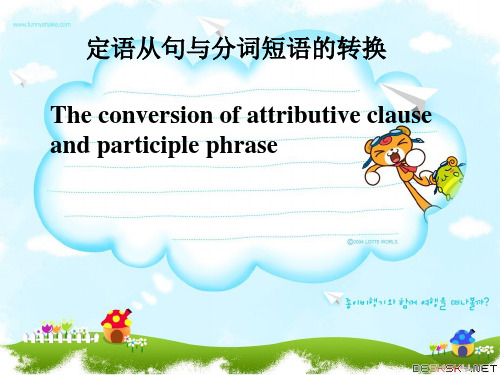
定语从句转换成现在分词短语做后置定语, 有主动或进行的意思。先行词与现在分词
有主动关系
• The boys who are playing tennis are my friends. • The boys playing tennis are my friends. • I know the boy who is running in the park. • I know the boy running in the park
用定语从句完成下列句子.
The man standing under under 1. The man is my brother. He is standing The man who is standing the tree under the tree. _____________________. is my brother the tree is my brother.
Fill in the blanks with proper participles
• 1. The scientist _________ us a talk just now is giving from Tsinghua University. (give) • 2. The teacher followed by her students came ________ in. (follow) singing • 3. The girl ________ for us at the party is Tom’s sister. • (sing) performed • 4. The play ___________ last night was written by Shakespeare. (perform) shown • 5. I love the movie ________ on TV last night. (show)
宾语从句的转换与提问
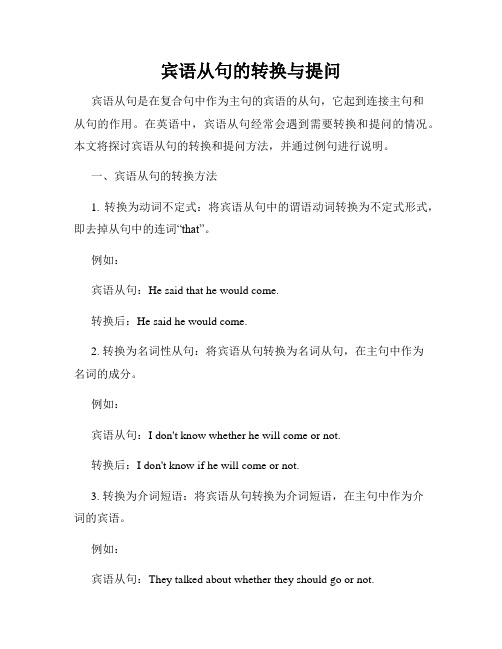
宾语从句的转换与提问宾语从句是在复合句中作为主句的宾语的从句,它起到连接主句和从句的作用。
在英语中,宾语从句经常会遇到需要转换和提问的情况。
本文将探讨宾语从句的转换和提问方法,并通过例句进行说明。
一、宾语从句的转换方法1. 转换为动词不定式:将宾语从句中的谓语动词转换为不定式形式,即去掉从句中的连词“that”。
例如:宾语从句:He said that he would come.转换后:He said he would come.2. 转换为名词性从句:将宾语从句转换为名词从句,在主句中作为名词的成分。
例如:宾语从句:I don't know whether he will come or not.转换后:I don't know if he will come or not.3. 转换为介词短语:将宾语从句转换为介词短语,在主句中作为介词的宾语。
例如:宾语从句:They talked about whether they should go or not.转换后:They talked about going or not.二、宾语从句的提问方法1. 提问宾语从句:将宾语从句的语序调整为疑问句的语序。
例如:宾语从句:He asked me if I had seen the movie.提问后:Did he ask you if you had seen the movie?2. 提问宾语从句的特殊疑问词:在宾语从句中使用特殊疑问词提问。
例如:宾语从句:I want to know what time the train arrives.提问后:What time do you want to know the train arrives?3. 提问宾语从句的选择疑问词:在宾语从句中使用选择疑问词提问。
例如:宾语从句:I'm not sure which book he wants to buy.提问后:Which book are you not sure he wants to buy?三、宾语从句的转换与提问练习1. 宾语从句转换练习:原句:She told me that she was feeling sick.转换后:She told me ___________________________.2. 宾语从句提问练习:原句:He asked me if I could help him with the project.提问后:_____________________________________?总结:本文讨论了宾语从句的转换与提问方法,通过实例对不同的转换和提问情况进行了详细说明。
定语从句与名词性从句的互换

定语从句与名词性从句的互换定语从句与名词性从句的互换⼀、定语从句和名词性从句由于表达意思的需要,有时可以互相转换。
⼤致有下⾯三种情况:(1)定语从句与表语从句的互换That's the thing that we're worrying about.(定语从句)That's what we're worrying about.(表语从句)那就是我们正在担⼼的事。
This is the way she did it.(定语从句)This is how she did it.(表语从句)这就是她做这件事的⽅法。
This is the reason why we must go now.(定语从句)This is why we must go now.(表语从句)这就是我们现在该⾛的理由。
That is the place where Xiao Lin was born.(定语从句)That is where Xiao Lin was born.(表语从句)那就是⼩林出⽣的地⽅。
(2)定语从句与宾语从句的互换I don't know the reason why she is so happy.(定语从句)I don't know why she is so happy.(宾语从句)我不知道她为什么这样⾼兴。
He showed me the place where he used to live.(定语从句)He showed me where he used to live.(宾语从句)他带我看了他曾经住过的地⽅。
Do you know the date when Wuhan was liberated(定语从句)Do you know when Wuhan was liberated(宾语从句)你知道武汉是什么时候解放的吗(3)定语从句与主语从句的互换The thing that we need is more time.(定语从句)What we need is more time.(主语从句)我们所需要的是更多的时间。
- 1、下载文档前请自行甄别文档内容的完整性,平台不提供额外的编辑、内容补充、找答案等附加服务。
- 2、"仅部分预览"的文档,不可在线预览部分如存在完整性等问题,可反馈申请退款(可完整预览的文档不适用该条件!)。
- 3、如文档侵犯您的权益,请联系客服反馈,我们会尽快为您处理(人工客服工作时间:9:00-18:30)。
主语从句(The Subject Clause)1.主语从句与定语从句的转换He was chosen , which made us very excited. Whoever breaks the law should be punished. Anyone who breaks the law should be punished. 2. 主语从句与动名词复合结构的转换That he was chosen made us very excited.His being chosen made us very excited.3.主语从句与不定式复合结构的转换It was clear that he had taken the money.It was clear for him to have taken the money.It was said that they had found the criminal. They were said to have found the criminal.It is said that he was a doctor.He was said to be a doctor.It is necessary that you should think carefully before you act.It is necessary for you to think carefully before you act.How we get there is a question.How to get there is a question.It is unwise that he is talking the topic all the time. It is unwise for him to be talking all the time.It is said that the building had been destroyed in a fire two years ago.The building is said to have been destroyed in a fire two years ago.表语从句(The Predicative Clause)1表语从句与不定式The question is whether she can speak English. The question is whether to speak English there. His wish was to become a cashier.His wish was that he would become a cashier.The question is how we can help him.The question is how to help him.2. 表语从句与定语从句That is why you are always late for school.That is the reason why you are always late for school.同位语从句(The Appositive Clause)I have no idea when I will be back.I have no idea when to be back..宾语从句(The Object Clause)1.宾语从句与动名词He is sorry for what he has done.He is sorry for his having done.I don’t like that you are late.I don’t like your being late.He is very interested in what you are doing.He is very interested in your doing.2. 宾语从句与不定式The boy pretended that he was doing his homework when his mother came back.The boy pretended to be doing his homework when his mother came back.I wonder where I should go.I wonder where to go.The teacher told Mary that she should not be late for school again.The teacher told Mary not to be late for school again.I saw that he came and sat down.I saw him come and sit down.I heard her sing in her room last night.I heard that she sang in her room last night.3. 宾语从句与定语从句He told me what he had done .He told me all that he had done.I know why he studies so hard.I know the reason why he studies so hard.4. 宾语从句与分词I saw them playing basketball when I went past the playground.I saw that they were playing basketball when I went past the playground.5. 宾语从句与表语从句I suggest that you should go to school at once.My suggestion is that you should go to school at once.定语从句1.与不定式Do you have anything to say for yourself ?Do you have anything you want to say for yourself /Is there anything to do for you ?Is there anything I can do for you ?It is time for us to go home.It is high time that we went home.2.与分词The girl who is standing on the stage is my sister. The girl standing on the stage is my sister.This is the factory which was built in 1987.This is the factory built in 1987.3.与主语从句The reason why he didn’t turn up was not made clear.Why he didn’t turn up was not made clear.状语从句1.与不定式He visited London in order that he could see his parents.He visited London in order to see his parents.He was so fat that he couldn’t climb the tree.He was too young to climb the tree.We use a hammer so that we may knock in nails. We use a hammer to knock in nails.I was foolish because I expected him to write to me.I was foolish to have expected him to write to me.He was so lucky that he won the prize.He was lucky enough to win the prize.He was so near that I could not avoid him.He was too near for me to avoid him.2.与分词As he knew nothing about the matter , he kept quiet during the meeting.Knowing nothing about the matter, he kept quiet during the meeting.Because he didn’t know what to say, he kept quiet during the meeting.Not knowing what to say, he kept quiet during the meeting.After he had finished his work, he went out for a walk.Having finished his work, he went out for a walk. If weather permits, we’ll visit him.Weather permitting, we’ll visit him.3.与动名词We use a hammer so that we may knock in nails. We use a hammer for knocking in nails.The girl was praised because she often helpedothers.The girl was praised for often helping others.4.与介词短语They went out though it rained.They went out in spite of the rain.。
